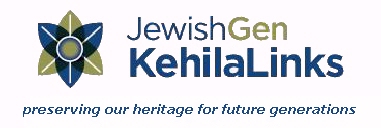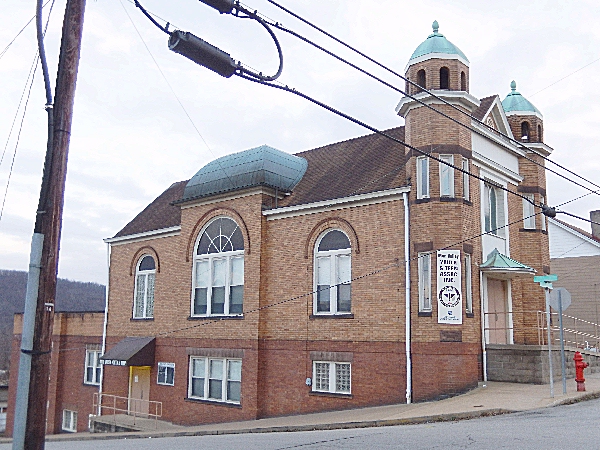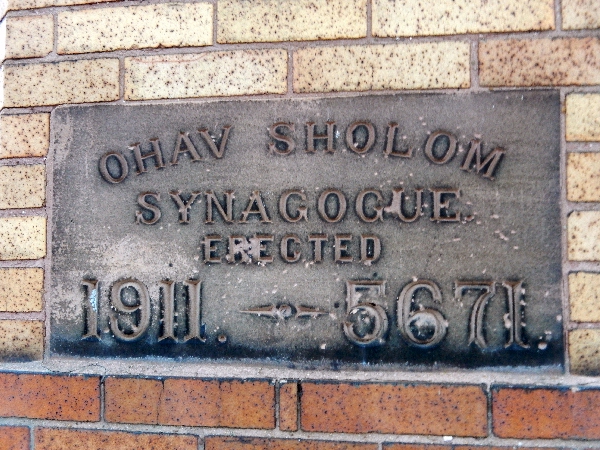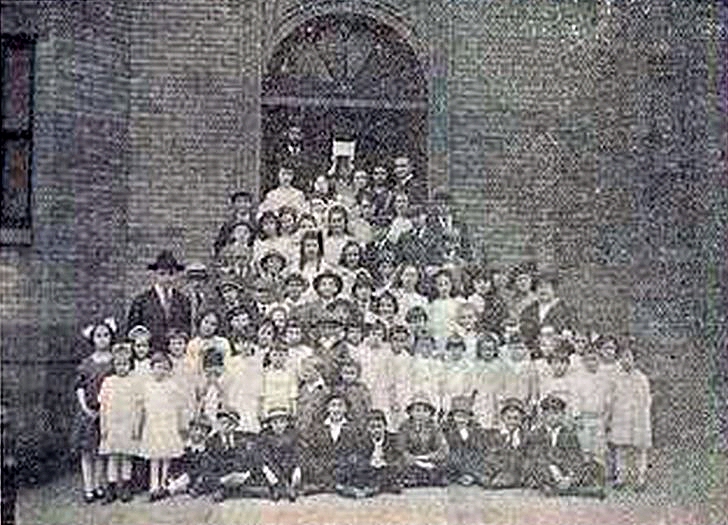| Donora Religious |
| ~ Religious Life ~ |
|---|
| If you have information concerning the religious community of Donora, click HERE to e-mail me. |
| As mentioned earlier, from all of the records available, a man by the name of ALTMAN came to Donora in 1901 and he was the first Jewish person to make his home here. It did not take long before a few others followed and as the Jewish community increased in size, a movement was undertaken to organize a congregation. In 1904, the Ohav Sholom Congregation came into existence in Donora.
Around 1910, the Donora Jewish community banded together and showed their desire for the strengthening of their devotion to their religion and started raising money for a synagogue, and the plans were started for a splendid synagogue at a cost of $15,000 dollars. The synagogue was erected in 1911 and by the Spring of 1919, the mortgage was burned, amid fitting ceremonies. |
| (Click the images below to view a larger image.) |
||||||
|
| This active congregation is probably the leading one in the mid-Mon Valley, and judging by the opinion of those in neighboring towns, Donora had a right to make this claim.
It is only fair to say that much of the progress of the Donora community, from a Jewish standpoint, is due to the fact that they have such a splendid leader as Rabbi G. A. ELIFANT, who came to the Ohav Sholom congregation in 1916 as its first rabbi. His impression upon the religious and philanthropic life, not merely of the Jewish community, but upon the whole community, is noteworthy. He has assisted materially in promoting all of the civic movements of the city and he has fittingly represented coreligionists on all occasions. It is interesting to note that the congregation purchased a home, at a cost of $6,000. dollars, for the specific purpose of use by the congregation's rabbi. Providing a residence for the rabbi was innovative and other Jewish congregations followed the example of this small, but thoroughly progressive, congregation. In 1919, the officers of the congregation were Louis FRIED (President), H. RUBEN (Vice-president), M. MOSKOWITZ (Secretary), Samuel APPELBAUM (Treasurer) and A. BAUM (trustee). By 1919, there were 300 Jews residing in Donora. There is one thing above all others that the Donora Jews take a pride in, and that is in their community. They were doing things all the time. They wanted to be among the live communities of the country and exert their utmost efforts in promoting those causes that will react to the benefit of their brethren, their faith and their community. Many communities of far greater numbers could be inspired by the example of the religious and philanthropic life of the small group of earnest Jewish men and women of Donora. There was a well-organized religious school which had sessions during the week, as well as on Sundays. The children were taught Hebrew language and Hebrew literature. The officers of the daily school were Max CORNISH (President), Ben ROTH (Vice-president), Nathaniel FRIEDLANDER (Secretary), and Rabbi ELIFANT was, of course, the instructor. There were 50 pupils enrolled in the daily school and 75 in the Sunday school. This attention to the religious training of the young cannot be overestimated in relation to the great influence it will have upon the future of our faith. The Sunday school was exceptionally well-organized with the competence of the teachers who give a great deal of their time to their work. Mr. Moses MILLER was superintendent and Miss MOSKOWITZ, Miss IRWIN, Miss HEATTER, Miss MILLER and Miss SILVERMAN were the teachers. It is not unusual to find, in such a small group, so many young women capable and willing to undertake this task. And too much credit cannot be given to them for their efforts in the most important of all branches of the Jewish faith—teaching the Jewish youth. |
| ~ My Rememberances 1942-55 ~ |
|---|
| by Sidney MISHKIN, USA |
| "Donora remained the Traditional religious center of the Mon Valley after WWII until the late 1950's when the mills began to cut back production, business suffered and people began to move elsewhere.
Donora always had a Rabbi during its years of prosperity. The Rabbi was also the Chazzan (Cantor), the Shochet (ritual slaughterer) and the Melamed (teacher). The community was committed to giving its children—both boys and girls—the best Jewish education possible. Students began Cheder (religious school) at age five in what was a one room school and some continued post Bar Mitzvah (coming of age ritual). Rabbi Samuel WEISS was the Rabbi in 1943 when I began Cheder. I'm not sure if he directly succeeded Rabbi ELIPHANT. He was succeeded by Rabbi Benjamin KROHN (wife Bea) who I believe remained as Rabbi until at least the the mid-fifties. He was our last full-time Rabbi. Children from Charleroi and Monongahela were also educated in Donora's Cheder. Regular weekly Shabbat (Sabbath) services, of course, were the norm when the community had Rabbis, and congregants would call other congregants to make a Minyan (a quorum of at least 10 men who have been Bar Mitzvahed) during the week when they had Yahrzeits (anniversary of the death of a loved one). Donora cheder students were taught to read and write Hebrew, lead prayers, read Torah (first five books of the Bible) and Haftorah (biblical selections from the Books of the Prophets) and do everything else necessary to perpetuate Judaism. Some of the regular adult Shabbat synagouge attenders were Irwin WEISS, Benjamin FRIEDLANDER, Samuel KONINGSBERG and Isaac MEYERSON. Mr. Joseph KONINGSBERG was the auctioneer of the High Holiday aliahs (calling of a member of the congregation to the bimah (raised platform area in a synagogue for a Torah reading segment), which was a good fundraiser for the Congregation. Some of the people I remember from cheder were the ACKERMAN brothers, Sidney, Harry and Milton ("Mickey"); Wilfred ("Butch") WEISS; Sammy BALIS; Harvey RUBIN, Sidney and David STADTLANDER from Monongahela; Rabbi WEISS's children Shimmy and Ruby; Lonnie WOLF; Barry ROTH; Mark ANSTANDIG; Murray and Myron FRIEDLANDER, Polly WEISS, Sheldon and Benjamin "Benny" HABERMAN and Martin and Toby ACKERMAN." |
| ~ My Rememberances ~ |
|---|
| by Devra (née MILLER) BRESLOW, USA |
| "I spent 16 months living in Donora with my long living Miller grandparents and my uncle Herman in the late 30s, and visited many times afterwards. Frankly, it was the richest part of my first 10 years to be in Donora and in that home. I was old enough to remember one of our great-grandparents, Bertha Kwass. She lived with us in the late 30s. Also in the late 30s when I lived with my grandparents, the non-Jewish housekeeper was Hannah Ramsden.
I do not know much about other Jewish families there then, but I do remember the Segal family (our neighbors), Mr. Mermelstein (the Kosher butcher) and his daughter Beverly, who was my classmate in elementary school. There was a Dolly, but I do not recall her surname. She was sickly and died before she was 15, my recollection of leukemia. There were enough Jewish families to support a synagogue (which also had members from Charleroi and Monessen, perhaps other towns along the Mon), a Sunday school. I do not recall if there was a resident rabbi or only an itinerant one. And a Kosher butcher! It still amazes me that the community was large enough for Mr. Mermelstein to make a very handsome living. I was close to his daughter Beverly. My grandfather, Mose Miller, and his oldest son Herman, were merchants, Miller's for Men. They had a rival across the street, also Jewish. All of this observant Jewish life is a rich memory. For my parents and my father and his sisters, they left Orthodoxy for Reform Judaism. My oldest aunt, Esther Miller, married a Reform rabbi from Washington, PA in 1939--Rabbi Henry Kagan. My father, Louis Miller, essentially gave up an Orthodox life when he entered Brown University, in 1925, just short of his 17th birthday. His younger sister, Sally (Sara) (nee Miller) Brash, married Eugene Brash, a modern Jewish engineer. While I do not remember any Jewish doctors in Donora in the 30s, Attorney Arnold Weiss was a lawyer in Donora who distinguished himself in Europe in WWII. Arnold was the family lawyer and managed the meager estates of my grandparents and Uncle Herman. What was left was the family row house, which was not sold on Herman's death but rented, the 3 remaining siblings getting a modest annual income. All 3 of them are now deceased, so I have no idea what has become of the house. My aunts, Sis and Sally, made an inventory of the furnishings and those of us with a passion for family specified what we wanted. I selected simple hints from the kitchen, such as the meat grinder and large bowls, which held dough for Friday's challah making. For me, the house is rich with vivid memories. Donora itself is scrubbed clean since 1956 when the mills closed and many residents left for other productive communities. And, yes, the pride of Donora was Stan Musial! My husband and I visited Donora and Attorney Weiss in the late 90s, and I think, possibly a few years later. Attorney Weiss and my husband served in the Pacific Theater together during WWII, and exchanged war stories. Attorney Weiss died a year or two later. He was nearly blind when we saw him. My husband, Dr. Lester Breslow of Bismarck, ND, Minneapolis and California, passed away in 2012—he was 97. The Jewish residents in Donora known to me are my father's family: Mose Miller, 1878, Baltimore, MD; died in 1948, Donora, Pa. Herman Miller, 1901, Cumberland, MD; died 1981 or 82, Scottsdale, AZ (brother of Mose) Rachel Kwass Miller, 1880, Telesai, Lithuania; died 1967, Pittsburgh, Pa Esther Miller Kagan, 1903; died 1998, Philadelphia, Pa Rabbi Henry Kagan, was born and raised in Washington, Pa (husband of Esther) Sarah Miller Brash, 1911; died 2009, Tucson, AZ When I moved back to my native community in Manchester, NH, I left my Jewish life in Donora, but of course not my family. I tended to visit Donora annually, even after I moved to Northern California in 1954." |
| ~ Jewish Organizations ~ |
|---|
| Sons of David Organization |
| This fraternal organization of the Donora's Jews had a membership of 60, and which followed and which functions purely, as a maternal body. The officers of the sons of David are John LAUTMAN (President), Max MOSKOWITZ (Vice-president), Adolf MOSKOWITZ (Secretary), Morris WISE (Treasurer) and Jacob HATTER (trustee).
The door was ripe for a B'nai B'rith Lodge, which is a broader platform, and more idealistic, than an organization which is solely fraternal and character. Later, some of the progressive leaders of the community established a B'nai B'rith Lodge in Donora. |
| Young Man's Hebrew Association (Y.M.H.A) |
|---|
| Organized in 1919, this important organization had a membership of 150. This is a remarkable showing and the young men are to be congratulated upon their support of such an organization in such splendid numbers. The association had no quarters of its own as yet, so their meetings were held in the synagogue. Knowing the spirit of Donora, it wasn't long before they had a building of their own. The members gave a good account of themselves in every phase of Jewish activity in the community. The officers were H SILVERMAN (President), H. PEARLMAN (Vice-president), S. PAUL (Secretary) and H PEARLMAN (Treasurer). |
| The Ladies' Aid Society |
|---|
| This organization was important to Jewish and Donora the community. In every community, the women do the best work and they were not alone considering the needs of those in want. They strive to develop the standard of their membership along educational lines.
In 1919, during the war, this aid society rendered excellent service in their Red Cross work, United War work, solicited funds for the war relief, helped to collect money for Jewish war sufferers and entered heartily into all those activities which required the utmost from the nation in that in time of the great trial. In addition to their other functions, they affiliated as an auxiliary of the congregation and in diverse ways, they serve to the advantage of the congregation. The officers were Mrs. M. D. COHEN (President), Mrs. J. SILVERMAN (Vice-president), Mrs. J. LAUTMAN (Secretary) and Mrs. S. APPELBAUM (Treasurer). These ladies individually, as well as all members, are among the foremost in all worthy community efforts. |
| Young Woman's Hebrew Association (Y.W.H.A.) |
|---|
| Is very unusual to find a Y.W.H.A. in a small community, it seems that the Donora Jewry doesn't overlook any grouping that may serve a good purpose to develop and improve the communal spirit. This association of 40 young women are did their part in the Jewish life of Donora. As Donora works very much in cooperation with Pittsburgh Jewish leaders, as soon as the Pittsburgh Y.W.H.A. develops, that will have a very beneficial effect upon the Donora group and we are confident that the Pittsburgh women will assist their sisters in the smaller community. |
| Observations Society |
|---|
| This rather out of the ordinary organization had as its members every Jewish child in Donora. The purpose, as the name indicates, is to promote the observing facilities of the faith. Children and those who have witnessed the sessions of the youngsters, say that is very interesting and very educational. The officers were Leonard FRIED (President) and Bernard WISE (Vice-president). |
| ~ Summary ~ |
|---|
| So all in all, the Donora Jewish community has reason to be proud of their efforts. Not many groups, of equal number, had so many and so varied activities. This enterprising community kept the values and causes of Judaism and their community. In creating organizations and societies—that show their appreciation of the value of the spiritual side of their faith—the Jewish community of Donora was commended for their progress developing the right kind of Jewish community. |
|
| This page is hosted at no cost to the public by JewishGen, Inc., a non-profit corporation. If you feel there is a benefit to you in accessing this site, your JewishGen-erosity is appreciated. |
| Created and Compiled by: Marshall J. KATZ, USA with assistance from: and the following: JewishGen members/descendants and contributors of Donora Jewish families: Sam BALIS, USA Sidney MISHKIN, USA Marilyn POSNER, USA |
| Updated: 22 September 2020 |
| Copyright ©2015 Marshall J. Katz All rights reserved |
 |
Top of Page |



